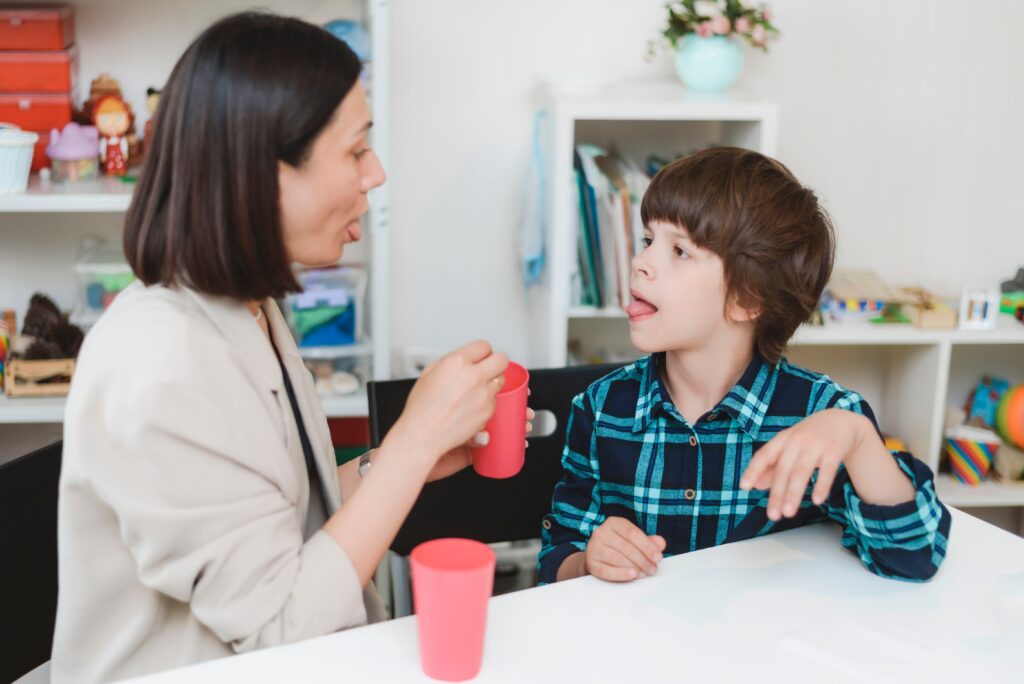
Blog
Baby Teeth and Speech Development: How Are They Connected?
Author: DrSensory
June 5, 2025
Baby Teeth and Speech Development: How Are They Connected?
The eruption of baby teeth is a major milestone in a child’s early development, but did you know that baby teeth play a crucial role in speech development as well? It’s not just about having a smile full of pearly whites – the timing and health of your child’s baby teeth can significantly impact how they learn to communicate, make sounds, and form words.
In this blog, we’ll explore how baby teeth are connected to speech development, what happens when there are delays in tooth eruption, and how you can support your child’s oral health for better communication skills.

Can Delayed Tooth Eruption Impact Communication?
When your child’s baby teeth come in (usually between six months and one year), they serve as essential tools for biting, chewing, and speaking. Baby teeth help your child learn how to move their tongue, lips, and jaw in coordinated ways—skills that are critical for clear speech.
If there is a delay in tooth eruption or issues with the timing of the eruption, it can cause a ripple effect that impacts speech development. Here’s how:
- Difficulty with Sound Production: The teeth are involved in the articulation of many sounds, especially those that require the tongue to touch the teeth or palate, such as “s,” “t,” “d,” and “th” sounds. Delayed eruption may make it difficult for a child to pronounce these sounds correctly.
- Mouth Posture and Breathing: If baby teeth come in out of order or fail to erupt as expected, it can affect how your child holds their mouth while speaking. Improper mouth posture may lead to issues like a lisp or unclear speech.
- Feeding and Oral Motor Skills: Delayed tooth eruption often correlates with slower development of oral motor skills, which can impact the ability to chew, swallow, and speak properly. These skills are all interconnected, so feeding delays can also influence speech delays.
If your child’s teeth are slow to come in, it’s important to monitor their speech development and consult with a pediatric dentist if you have concerns.
Baby Teeth and Speech Development: How Are They Connected?
Promoting Oral Motor Development for Speech and Feeding
Delayed Speech in Children: Causes, Signs, and Therapy Options
Oral Motor Milestones for Early Childhood
As your child grows, their oral motor skills will evolve. These skills, which include the ability to move the tongue, lips, and jaw in a coordinated manner, are foundational for both feeding and speaking. Here are some general oral motor milestones to keep in mind:
- 6-9 Months: During this stage, infants begin to develop the basic oral motor skills needed for feeding and making sounds. The first teeth usually appear during this period, and babies start babbling or making consonant-vowel combinations.
- 12-18 Months: By this age, most children will have a few teeth and are beginning to practice more complex sounds. They may start using a variety of consonant sounds like “m,” “b,” and “d.”
- 2-3 Years: By age 2, children will typically have a mix of baby teeth, and their speech skills begin to resemble those of an older toddler. They can form more complicated words and sentences, though articulation may still be developing.
- 3-5 Years: As children approach preschool age, they typically have a full set of baby teeth and begin to make clearer speech sounds. This is when many children master more complex consonants like “s,” “r,” and “l.”
If your child’s tooth eruption is delayed or their teeth are misaligned, it may take longer for them to reach these oral motor milestones.
Typical Milestones in Speech and Language Development for Birth to Seven
When Is Thumb Sucking a Problem? A Developmental Guide for Parents
What Can Parents Do to Support Speech and Oral Development?
As a parent, you can support your child’s oral and speech development in several ways:
- Monitor Tooth Eruption: Keep track of when your child’s baby teeth begin to come in. If teeth are delayed or coming in out of order, mention it to your pediatric dentist.
- Encourage Mouth Exercises: Simple activities like blowing bubbles, chewing on age-appropriate toys, or even mimicking animal sounds can help your child strengthen their oral muscles and improve their speech.
- Promote Healthy Eating Habits: Encourage your child to eat a variety of textures to help develop their chewing and swallowing skills. Solid foods like crunchy fruits and vegetables can also help with oral motor function.
- Consult a Pediatric Dentist: If you notice that your child is having trouble with tooth eruption or oral motor development, consult with a pediatric dentist to rule out any underlying issues like a tongue tie, lip tie, or misalignment of the teeth.
- Speech Therapy: If your child is showing signs of delayed speech or difficulty pronouncing certain sounds, working with a speech-language pathologist can help them develop clearer speech patterns.
Development of Nasal Breathing for Children
Conclusion: Healthy Teeth, Healthy Speech
The connection between baby teeth and speech development is an important one, and taking care of your child’s oral health from an early age can help them develop the skills needed for clear communication. If you notice delays in tooth eruption or speech, don’t hesitate to consult a pediatric dentist. Early intervention can ensure that your child’s oral health and speech development stay on track, allowing them to enjoy a lifetime of confident communication and healthy smiles.
related blogs
Your child is constantly moving, crashing into furniture, or having meltdowns in response to seemingly minor things like a loud
Your toddler refuses to wear certain clothes, has huge meltdowns in noisy places, or is an extremely picky eater, limited
Your child seems to miss verbal instructions, struggles to follow conversations in noisy environments, and often asks "what?" even when
On the surface, autism and Ehlers-Danlos syndrome (EDS) might seem like two entirely unrelated conditions. One is a neurodevelopmental condition
The intense head pain begins, lights feel blindingly bright, and every sound seems amplified to an unbearable level. You retreat











































































